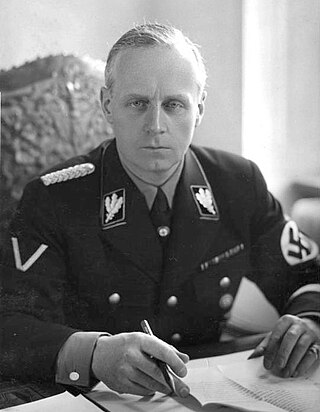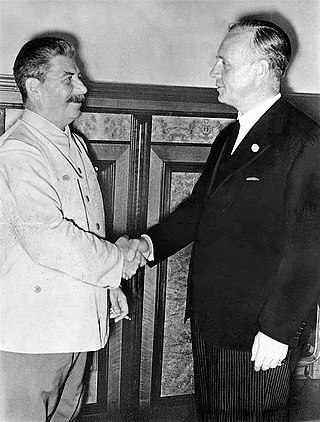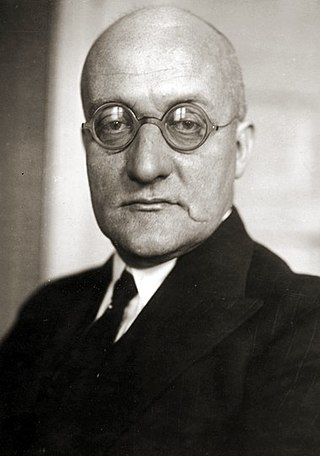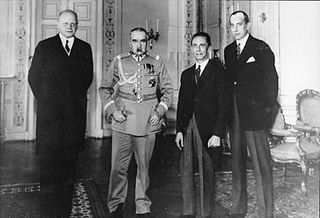
Ulrich Friedrich-Wilhelm Joachim von Ribbentrop was a German politician and diplomat who served as Minister of Foreign Affairs of Nazi Germany from 1938 to 1945.

The Molotov–Ribbentrop Pact, officially the Treaty of Non-Aggression between Germany and the Union of Soviet Socialist Republics, was a non-aggression pact between Nazi Germany and the Soviet Union with a secret protocol that partitioned Central and Eastern Europe between them. The pact was signed in Moscow on 23 August 1939 by German Foreign Minister Joachim von Ribbentrop and Soviet Foreign Minister Vyacheslav Molotov. Unofficially, it has also been referred to as the Hitler–Stalin Pact and the Nazi–Soviet Pact.

Following the Invasion of Poland at the beginning of World War II, nearly a quarter of the entire territory of the Second Polish Republic was annexed by Nazi Germany and placed directly under the German civil administration. The rest of Nazi-occupied Poland was renamed as the General Government district. The annexation was part of the "fourth partition of Poland" by Nazi Germany and the Soviet Union, outlined months before the invasion, in the Molotov–Ribbentrop Pact.

Seventeen days after the German invasion of Poland in 1939, which marked the beginning of the Second World War, the Soviet Union entered the eastern regions of Poland and annexed territories totalling 201,015 square kilometres (77,612 sq mi) with a population of 13,299,000. Inhabitants besides ethnic Poles included Belarusian and Ukrainian major population groups, and also Czechs, Lithuanians, Jews, and other minority groups.

Western betrayal is the view that the United Kingdom, France, and sometimes the United States failed to meet their legal, diplomatic, military, and moral obligations with respect to the Czechoslovak and Polish states during the prelude to and aftermath of World War II. It also sometimes refers to the treatment of other Central and Eastern European states at the time.

The German–Soviet population transfers were population transfers of ethnic Germans, ethnic Poles, and some ethnic East Slavs that took place from 1939 to 1941. These transfers were part of the German Heim ins Reich policy in accordance with the German–Soviet Frontier Treaty between Nazi Germany and the Soviet Union.

Józef Beck was a Polish statesman who served the Second Republic of Poland as a diplomat and military officer. A close associate of Józef Piłsudski, Beck is most famous for being Polish foreign minister in the 1930s and for largely setting Polish foreign policy.

Eduard Willy Kurt Herbert von Dirksen was a German diplomat who was the last German ambassador to Britain before World War II.

The German–Polish declaration of non-aggression, also known as the German–Polish non-aggression pact, was an agreement between Nazi Germany and the Second Polish Republic that was signed on 26 January 1934 in Berlin. Both countries pledged to resolve their problems by bilateral negotiations and to forgo armed conflict for a period of 10 years. The agreement effectively normalised relations between Poland and Germany, which had been strained by border disputes arising from the territorial settlement in the Treaty of Versailles. The declaration marked an end to an economically damaging customs war between the two countries that had taken place over the previous decade.
The military alliance between the United Kingdom and Poland was formalised by the Anglo-Polish Agreement in 1939, with subsequent addenda of 1940 and 1944, for mutual assistance in case of a military invasion from Nazi Germany, as specified in a secret protocol.

The remilitarisation of the Rhineland began on 7 March 1936, when military forces of the German Reich entered the Rhineland, which directly contravened the Treaty of Versailles and the Locarno Treaties. Neither France nor Britain was prepared for a military response, so they did not act. After 1939, commentators often said that a strong military move in 1936 might have ruined the expansionist plans of Adolf Hitler, the dictator of Germany. However, recent historiography agrees that both public and elite opinion in Britain and France strongly opposed a military intervention, and neither had an army prepared to move in.

The Soviet invasion of Poland was a military conflict by the Soviet Union without a formal declaration of war. On 17 September 1939, the Soviet Union invaded Poland from the east, 16 days after Nazi Germany invaded Poland from the west. Subsequent military operations lasted for the following 20 days and ended on 6 October 1939 with the two-way division and annexation of the entire territory of the Second Polish Republic by Nazi Germany and the Soviet Union. This division is sometimes called the Fourth Partition of Poland. The Soviet invasion of Poland was indirectly indicated in the "secret protocol" of the Molotov–Ribbentrop Pact signed on 23 August 1939, which divided Poland into "spheres of influence" of the two powers. German and Soviet cooperation in the invasion of Poland has been described as co-belligerence.

Władysław Gizbert-Studnicki was a Polish politician and publicist. Throughout his life, Studnicki was famous for his strongly pro-German stance, and in the Polish People's Republic all his books were banned from publication. He was the older brother of historian Wacław Studnicki.

Katyń is a 2007 Polish historical drama film about the 1940 Katyn massacre, directed by Academy Honorary Award winner Andrzej Wajda. It is based on the book Post Mortem: The Story of Katyn by Andrzej Mularczyk. It was nominated for Best Foreign Language Film for the 80th Academy Awards.

Stanisław Witold Aronson is a Polish Jew and an Israeli citizen, as well as a former officer of the Polish Home Army (AK) with a rank of lieutenant colonel. He was also a member of the Kedyw unit, "Kolegium A", of the Warsaw Region of AK, a participant in the Warsaw Uprising of 1944, and a lieutenant colonel of the Israeli Defense Force who took part in the 1947–1949 Palestine war, the Yom Kippur War and the 1982 Lebanon War.

The occupation of Poland by Nazi Germany and the Soviet Union during World War II (1939–1945) began with the Invasion of Poland in September 1939, and it was formally concluded with the defeat of Germany by the Allies in May 1945. Throughout the entire course of the occupation, the territory of Poland was divided between Nazi Germany and the Soviet Union (USSR), both of which intended to eradicate Poland's culture and subjugate its people. In the summer-autumn of 1941, the lands which were annexed by the Soviets were overrun by Germany in the course of the initially successful German attack on the USSR. After a few years of fighting, the Red Army drove the German forces out of the USSR and crossed into Poland from the rest of Central and Eastern Europe.

The Danzig crisis was a 1939 crisis that led to World War II breaking out in Europe.

Japan–Poland relations refers to the bilateral foreign relations between Japan and Poland. Both nations enjoy historically friendly relations, embracing close cooperation and mutual assistance in times of need. Both are members of the OECD, World Trade Organization and United Nations.
Robert Coulondre was a French diplomat who served as the last French ambassador to Germany before World War II.

















